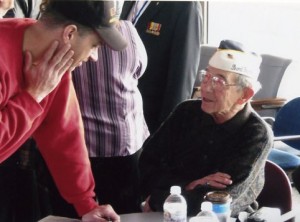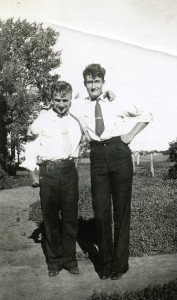Several Comments follow this post. To comment, send an e-mail to me. My e-mail address can be found on the “About” page. Short comments preferred.
A year ago, October, 2008, I worried that the American financial system, and thus my modest nest egg, was in meltdown. I have a 401(k) from work career days, and it was plummeting in value. I decided to get the floor of its rapidly diminishing principal insured by the well-respected midwest company that had managed the fund since my retirement in 2000. I also decided to leave the remaining money where it was, with the same company managing it, with no change in the general investment strategy. (This company says it applied for TARP (bailout) money, but never actually had to take any of it.)
Mine was a small drama, doubtless played out in millions of ways by millions of people in the fall of 2008. We weren’t the big bad Wall Street firms, but our nest eggs were rapidly going up in smoke, due to virtually no government oversight, and lots of greed by big players far away.
When I pulled the plug, and bought the insurance policy on the floor of my asset a year ago, its value had plummeted by well over 30% in a single twelve month period.
Today, twelve months later, its value is almost exactly the same as it was two years ago. It’s value is 133% of what it was a year earlier, and I did nothing but leave it where it was.
I am very surprised. I certainly don’t expect a similar dramatic change in the next twelve months; at the same time, I am quite a bit more comfortable that there will not be another total meltdown either IF we have learned our collective lesson.
I expect tens of millions of people have similar stories. We are a very wealthy country, after all.
My experience, plus the endless yapping about the horrendous “crushing” National Debt, which supposedly prohibits government-financed things like Health Care Reform, has caused me to start to look at what I would call our National Wealth – our collective net worth as a country, and indeed, developed world.
There are, granted, huge numbers of people in our country, let alone in the third world, who are destitute. Our wealth has come on their backs.
But if one does even a cursory study of the collective wealth of ordinary people like me, and those who are truly wealthy, we are awash in almost unbelievable wealth, and our National Debt is a very small percentage of that Wealth. If you don’t believe this, reader, do a quick mental assessment of your own personal wealth: what you would have if you liquidated everything you have which has any net value, like real estate, savings, the value of a retirement account like a 401(k), etc. And include in the value, other assets which you have which you possess but are in somebody else’s control: Medicare, your retirement fund, Social Security.
As I say, many don’t have these assets in abundance, but tens of millions, including myself, do. And I would not be considered “wealthy”, not by any stretch of that word.
If those of us with money had any kind of collective will at all, we could eliminate the debt, and live on pay as you go, easily.
So, why don’t we just eliminate the debt?
Greed helps secure the status quo: what’s mine is mine, after all. And if I had a burst of altruism and cashed out my stash, contributing everything to reduce the National Debt, my relatives and neighbors would think, with some good reason, that I was crazy. Likely they wouldn’t bail me out of my stupidity.
This is a societal problem, not an individual one to be solved by one individual at a time.
I think there is another logical and sinister factor in play. For the truly big economic players, Debt is a Blessing. You can multiply your money by charging interest on loans. “Credit” is as good as money in the bank for the lender, even considering bad debts. Think “I owe my soul to the company store” in older days parlance*.
Christmas shopping? “CHARGE or cash?” is what you hear at the cash register Cash is an undesirable option. Build up that debt.
It is the ultimate paradox: the very same business and industry that is investing hundreds of millions in ad campaigns to rage against “crushing debt” and the follies of reform (for political advantage), are the same ones lusting for even more debt (for ever more profit).
Cha Ching.
PS: I don’t know precisely what our National Wealth is. Lots of numbers are thrown around. I’ve been looking into this, and I’ve seen figures ranging as high as 24 Trillion dollars (24,000 Billion). October 19 at this space I wrote about the National Debt, then being reported as about 1 1/2 Trillion dollars (1,400 Billion), and on October 21, about the awful prospect, as conveyed by the Chamber of Commerce, that Health Care Reform might cost 300 Billion dollars.
Health Care Reform, et al, is chump change….
* – from the song Sixteen Tons, Merle Travis, 1946
COMMENTS:
Peter Barus: Good thinking. Money is all debt, as you probably know. In the early days, at least in the “West,” it was invented by gold smiths. There is an article floating around out there about how money is created by writing loans, out of nothing. The Fed lends “money” to the banks in the form of “bonds” against – well, nothing at all, really, and the banks lend ten times that amount, and the banks they lend to add their multiplier, and so on, and poof! The economy is born.
So, you might consider expanding and elaborating on your idea about debt being a blessing for the rich. It is, in fact, all they’ve really got.
Here is a pithy remark that I think comes from Brazil: “When s-it becomes of value, the poor will be born without a-sholes.”
Bruce Fisher: The basis for our financial system is money. And do you remember how money is created? It is loaned into existence (http://www.chrismartenson.com/crash course). The national debt is both a liability and an asset. it is a liability that we owe ourselves. Our financial system needs debt to create wealth. The national debt is, as you’ve mentioned, a small percentage of our national wealth. We could use our wealth as leverage to wipe out poverty and all other social ills that foster fear and insecurity that promote cruelty, isolation, disconnection that end in war and killing. You’re right, we have significant national wealth but it should be used to wipe out social ills not the national debt.
Bob Barkley: I’m with you about this issue of debt. It’s an evil that will choke and gag us all before it’s over. And here’s a little piece I wrote earlier in 2009 about this matter of debt.
Debt is playing a huge role in both our international affairs and here at home. We have generated tremendous national debt in other countries, sometimes dishonestly, so as to increase their dependency on the U.S. as a way of filtering U.S. foreign aid dollars right back to huge U.S. corporations. It’s an orchestrate and deceitful method of subsidizing these countries. In fact, Bush’s infamous “coalition of the willing” was seemingly made up largely of such beholden countries.
And we have an internal debt problem as well. At the same time that we have made bankruptcy filing more difficult, we have escalated the number and types of ways that individuals can increase their debt. We have charge cards with exaggerated debt ceilings, huge interest rates, and a person can hold many cards. Then we have no-down-payment home purchases where all you’re buying is debt – not a home. Added to this we have all sorts of efforts to encourage extension mortgages. So guess what has happened? Families in increasing numbers have charged themselves to the max and have now gone to their last possible place to get cash – extended mortgages. Foreclosures are occurring at an alarming rate.
But now this house of cards has finally collapsed. It was inevitable, and unfortunately it was also necessary. The charade must end.
All of this has further expanded the gap between the haves (the “economic royalists” if you will) and have-nots on every conceivable level. Anyone who doesn’t think we have become a class society, both here and abroad, simply isn’t paying attention. Where are the religious folks on this one – the return of usury in every corner of our existence?
Jim Fuller: A very quick and partial reply: You, like almost everyone else, think the worst is over and there will not be another such meltdown. I beg to differ. The chances of another and more complete worldwide economic collapse is not only possible, it is probable, though I won’t guess as to timing.
The high-rolling banks have all but retired from what used to be their primary business – lending to individuals and businesses. They aren’t doing it, and despite all the crap they’ve told government, they have no intention of doing it. Since the wall between commercial banking and investment houses was torn down by Bill Clinton, they have grown steadily away from what we think of as traditional banking. Playing the markets is their primary game now, and almost their sole source of wealth.
And they are again playing dangerous, extremely high-risk money games. There already have been several “instruments” invented to replace the phony mortgage packages, and the big boys are batting them around like crazy. And, inevitably, those, too, will collapse at some point because there is no underpinning of items with actual value. Government is doing no more now than it did before to stop these games.
And the next collapse must be more complete than the last one; governments won’t have the cash this time to do the massive bailouts that would be required. The assets, including taxable people, simply no longer are there.
Dick Bernard, to Jim: I, too, am a pessimist about the future. If I’m lucky, I won’t bear the consequences my grandkids will. I’m writing about the present debate. My 7-year old granddaughter, whose birthday party I’ll be attending this afternoon, will not see the promising future I could look forward to at her age, in 1947 – unless we as a society wake up really quickly.
Re Bill Clinton’s culpability, fair enough, but it might be helpful to point out that the 1999 law to which you likely refer had to be promoted and passed by the Republican House and Senate of the time. Some Republican Senator from Texas comes to mind…. Sen. Phil Gramm, wasn’t it?


